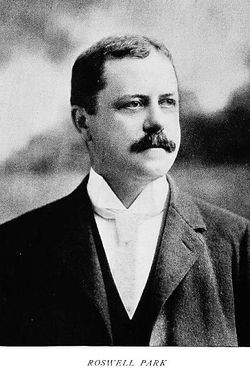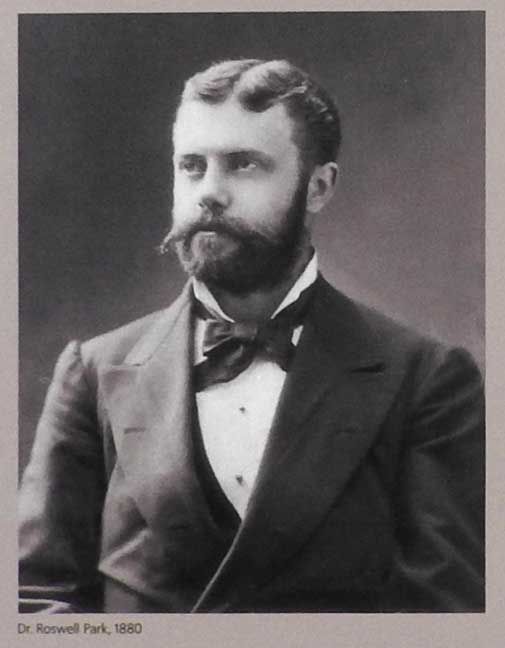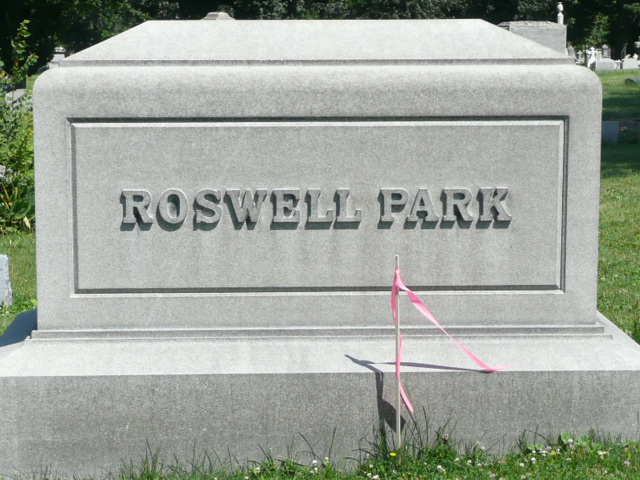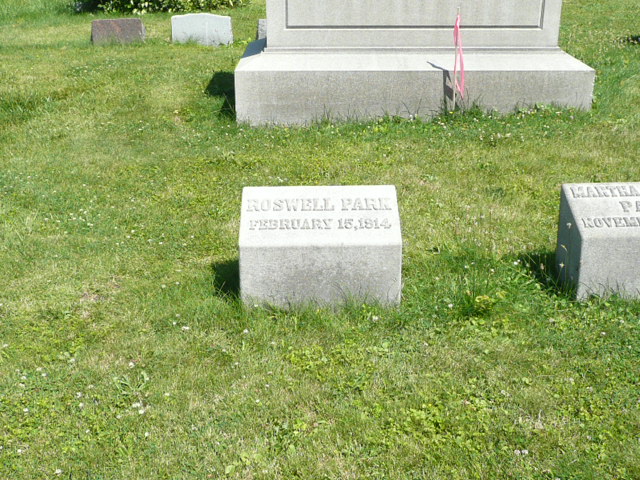Dr. Park's mother was Mary Brewster Baldwin, of a good New England family. One of her ancestors constructed the first dry dock in America for the U. S. Government.
Dr. Park went to school in Connecticut and later in the Racine grammar school and Immanuel Hall in Chicago, and finally graduated from Racine College (B. A., 1872; M. A., 1875). After his graduation he taught for one year in Immanuel Hall; he then entered the medical department of Northwestern University and after receiving his degree of M. D. (1876), served as interne in the Cook County Hospital. His medical teaching was begun in 1879, as demonstrator of anatomy in the Woman's Medical College of Chicago. In 1880 he was appointed adjunct professor of anatomy in the Northwestern University and in 1883 he resigned to study in Europe.
While yet abroad he was made lecturer in surgery in the Rush Medical College, and attending surgeon to the Michael Reese Hospital, Chicago. In 1883 he was elected to the chair of surgery in the University of Buffalo and surgeon to the Buffalo General Hospital. He accepted and moved to Buffalo in the summer of that year, to fill these positions until his death. Dr. Charles G. Stockton in his extended memoir of Dr. Park says: "His advent in Buffalo was opportune. It was the transitional period from old to new concepts in pathology at the threshold of modern surgery. Together with Mann, he re-educated the local medical profession and advanced greatly, through his sound pathology, novel teaching, operative skill and spreading fame, the reputation of the medical school. Thousands. not only his pupils, but active practitioners. acknowlege [SIC], as due to his influence, a forward momentum hard to estimate. Dr. Park was most studious, and not alone did medical science occupy his time, but other especially cognate subjects received his attention. As a result he became a sort of living encyclopedia to whom every one turned. Some of this information he rearranged and made available in books and addresses. This was, in fact, one of his strongest points and in this way he added to his proficiency as a linguist and made useful to others much material which otherwise never would have been seen by the bulk of the profession."
A few years after coming to Buffalo he was urged to return to Chicago to be associated with Dr. Senn, in the chair of surgery in Rush Medical College. As a counter inducement he was strongly urged to remain in Buffalo by a large committee of the most influential citizens and a fund was raised to construct a new and first-class clinic for his needs. After due deliberation he decided to remain in Buffalo. He was appointed honorary professor in surgery in the Army Medical School at Washington and a visitor at West Point Academy. He was president of the New York State Medical Society and of the American Surgical Association and surgeon-in-chief to the Buffalo General Hospital. In 1895 Harvard University gave him the degree of A. M., and in 1902 Yale conferred on him the degree of LL. D. He was a member of many clubs and societies at home and of a number of foreign surgical societies.
In 1892 Dr. Park gave the Mutter Lectures on surgical pathology in Philadelphia. He wrote a monograph on surgery of the head and brain and a well-known text-book on the history of medicine. He was editor and principal contributor to the "Text-book on Surgery by American Authors," 1896, and a text-book on general surgery. He also wrote many medical papers and essays, some of them being collected in book form, entitled "The Evil Eye" and other Essays.
In 1901 he was medical director of the Pan-American Exposition and was associated, with other physicians, in the care of President McKinley after he was shot, and he was instrumental in the establishment of the New York State Laboratory for the study of malignant diseases in Buffalo.
As a teacher he was noted for his lucidity of style and his capability of making clear the principles of his subject or case under discussion. In this capacity he achieved a great reputation and the enduring regard of his pupils.
Doctor Park married in 1880 Martha P. Durkee and had two sons who survived him. His home was a center for social, artistic and musical cultivation.
"A singularly forceful and graceful writer, a cogent speaker, a resourceful organizer, he was at the head and in the heart of most that was good in Buffalo, for it was understood that his aid meant success."
He died, probably of heart trouble, February 15, 1914, after a very short illness.
Dr. Park's mother was Mary Brewster Baldwin, of a good New England family. One of her ancestors constructed the first dry dock in America for the U. S. Government.
Dr. Park went to school in Connecticut and later in the Racine grammar school and Immanuel Hall in Chicago, and finally graduated from Racine College (B. A., 1872; M. A., 1875). After his graduation he taught for one year in Immanuel Hall; he then entered the medical department of Northwestern University and after receiving his degree of M. D. (1876), served as interne in the Cook County Hospital. His medical teaching was begun in 1879, as demonstrator of anatomy in the Woman's Medical College of Chicago. In 1880 he was appointed adjunct professor of anatomy in the Northwestern University and in 1883 he resigned to study in Europe.
While yet abroad he was made lecturer in surgery in the Rush Medical College, and attending surgeon to the Michael Reese Hospital, Chicago. In 1883 he was elected to the chair of surgery in the University of Buffalo and surgeon to the Buffalo General Hospital. He accepted and moved to Buffalo in the summer of that year, to fill these positions until his death. Dr. Charles G. Stockton in his extended memoir of Dr. Park says: "His advent in Buffalo was opportune. It was the transitional period from old to new concepts in pathology at the threshold of modern surgery. Together with Mann, he re-educated the local medical profession and advanced greatly, through his sound pathology, novel teaching, operative skill and spreading fame, the reputation of the medical school. Thousands. not only his pupils, but active practitioners. acknowlege [SIC], as due to his influence, a forward momentum hard to estimate. Dr. Park was most studious, and not alone did medical science occupy his time, but other especially cognate subjects received his attention. As a result he became a sort of living encyclopedia to whom every one turned. Some of this information he rearranged and made available in books and addresses. This was, in fact, one of his strongest points and in this way he added to his proficiency as a linguist and made useful to others much material which otherwise never would have been seen by the bulk of the profession."
A few years after coming to Buffalo he was urged to return to Chicago to be associated with Dr. Senn, in the chair of surgery in Rush Medical College. As a counter inducement he was strongly urged to remain in Buffalo by a large committee of the most influential citizens and a fund was raised to construct a new and first-class clinic for his needs. After due deliberation he decided to remain in Buffalo. He was appointed honorary professor in surgery in the Army Medical School at Washington and a visitor at West Point Academy. He was president of the New York State Medical Society and of the American Surgical Association and surgeon-in-chief to the Buffalo General Hospital. In 1895 Harvard University gave him the degree of A. M., and in 1902 Yale conferred on him the degree of LL. D. He was a member of many clubs and societies at home and of a number of foreign surgical societies.
In 1892 Dr. Park gave the Mutter Lectures on surgical pathology in Philadelphia. He wrote a monograph on surgery of the head and brain and a well-known text-book on the history of medicine. He was editor and principal contributor to the "Text-book on Surgery by American Authors," 1896, and a text-book on general surgery. He also wrote many medical papers and essays, some of them being collected in book form, entitled "The Evil Eye" and other Essays.
In 1901 he was medical director of the Pan-American Exposition and was associated, with other physicians, in the care of President McKinley after he was shot, and he was instrumental in the establishment of the New York State Laboratory for the study of malignant diseases in Buffalo.
As a teacher he was noted for his lucidity of style and his capability of making clear the principles of his subject or case under discussion. In this capacity he achieved a great reputation and the enduring regard of his pupils.
Doctor Park married in 1880 Martha P. Durkee and had two sons who survived him. His home was a center for social, artistic and musical cultivation.
"A singularly forceful and graceful writer, a cogent speaker, a resourceful organizer, he was at the head and in the heart of most that was good in Buffalo, for it was understood that his aid meant success."
He died, probably of heart trouble, February 15, 1914, after a very short illness.
Family Members
Sponsored by Ancestry
Advertisement
Records on Ancestry
Advertisement




















